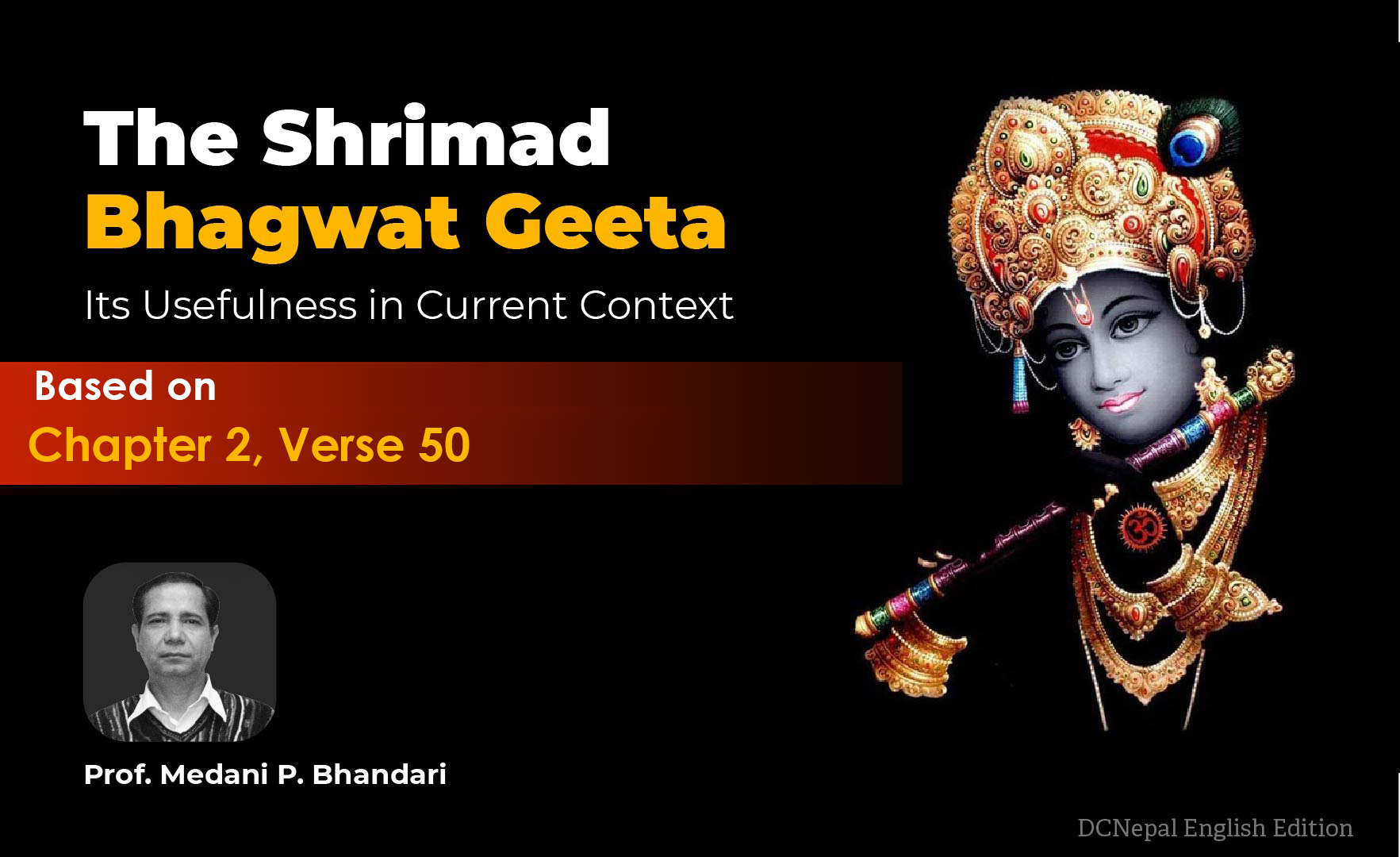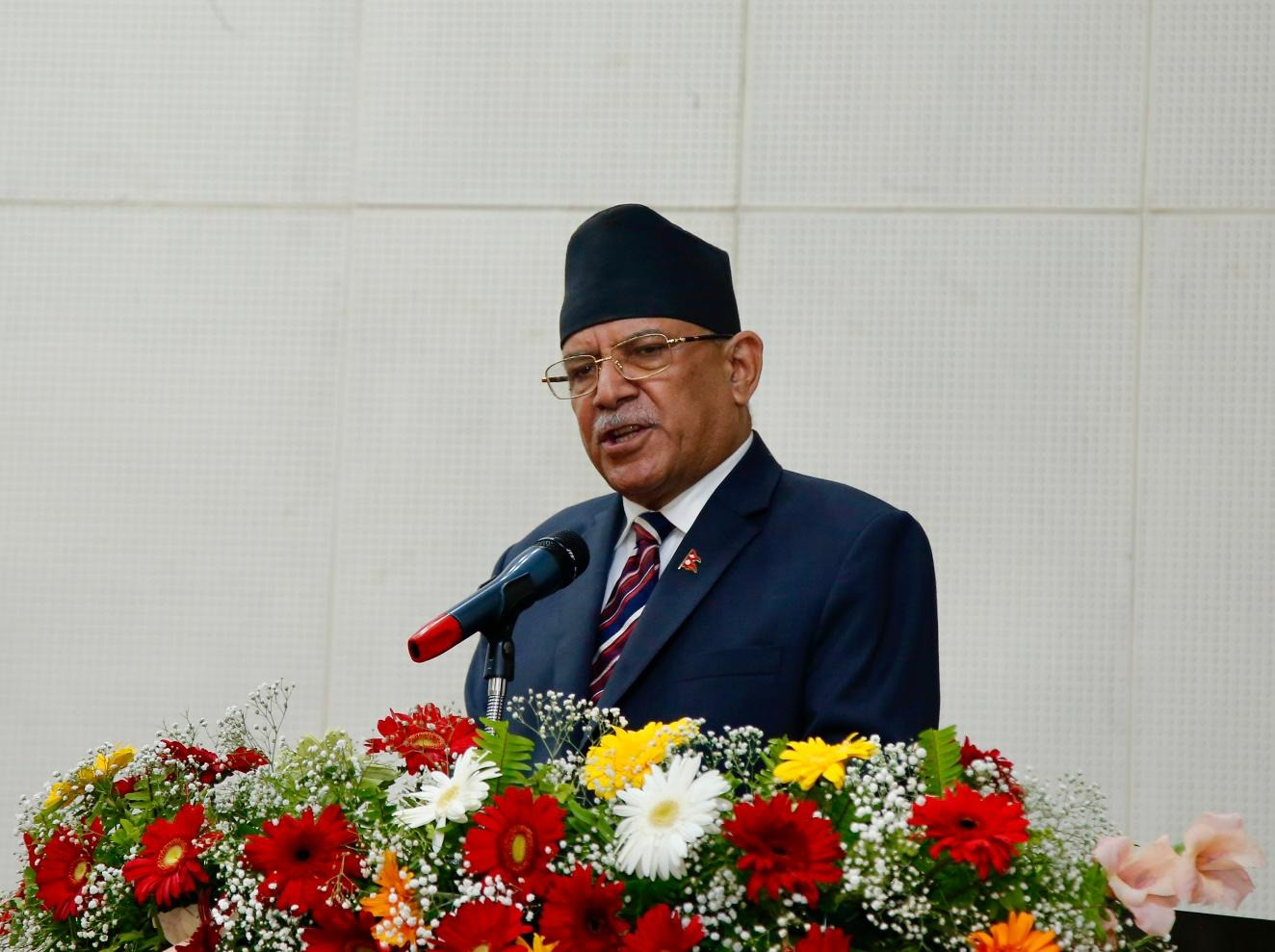The Shrimad Bhagwat Geeta and its Usefulness in Current Context
With reference to Chapter 2, Verse 50- बुद्धियुक्तोजहातीहउभेसुकृतदुष्कृते

The Bhagavad Gita, a revered Hindu scripture within the epic Mahabharata, comprises 700 verses across 18 chapters. It unfolds as a profound conversation between Prince Arjuna and Lord Krishna on the Kurukshetra battlefield. Lord Krishna imparts timeless wisdom, encompassing philosophical, ethical, and spiritual aspects. Beyond religious confines, the Gita offers insights into righteous living, self-realization, and the journey to spiritual enlightenment.
In the previous paper, I tried to elaborate on the timeless wisdom of Geeta, introducing its profound teachings and the practical significance of Chapter 2, Verse 47. Now, in this paper, I am trying another gem from the Geeta: Chapter 2, Verse 50. As we journey into the essence of this verse, it is essential to recognize that the interpretations and applications of its teachings may vary among individuals.
The Bhagavad Geeta is an expansive ocean of knowledge, wisdom, and practicality, encompassing profound insights into human experience. While I accept and recognize the limitations of my perspective, I seek to offer glimmers of insight based on my own experiences and understanding. Just like clean water quenches thirst, wet soil nurtures growth, and open sources of epistemology illuminate practical pathways of human life, the teachings of the Geeta provide abundant guidance for our journey.
Each individual’s interpretation of Geeta’s teachings is unique, and I do not claim that my understanding is universally applicable. Just as we create our own bubbles of perception, shaped by circumstances, relationships, and networks, we may be inclined to accept information that aligns with our preconceived notions. It is vital to acknowledge that our perspectives may differ, and diverse interpretations can coexist harmoniously.
While my thoughts are personal, I believe that the truth revealed in the Bhagavad Geeta transcends individual perspectives. It provides profound insights into harnessing humanity’s potential in the world. As we explore Geeta’s wisdom, we may uncover profound truths that resonate with our souls, guiding us on a path of self-discovery and self-realization.
In this journey of understanding Geeta’s teachings, let us cherish the richness of its knowledge and embrace the freedom to shape our own interpretations. It serves as a timeless beacon, illuminating the path to inner harmony, ethical living, and spiritual growth. As we delve into its depths, may we find solace in the shared pursuit of truth, and wisdom inspire us to contribute positively to the world around us.
Chapter 2, Verse 50: बुद्धियुक्तोजहातीहउभेसुकृतदुष्कृते।तस्माद्योगाययुज्यस्वयोगःकर्मसुकौशलम्॥
“A person who is endowed with wisdom casts aside both good and evil deeds. Therefore, devote yourself to the path of yoga (selfless action). Skill in action lies in the intelligent practice of yoga.”
Verse 50 offers a profound lesson on transcending success and failure, advising us not to be excessively attached to the outcomes of our actions. In the relentless pursuits of life, we often encounter moments of triumph and moments of setback. Dwelling excessively on these results can lead us on emotional rollercoasters, affecting our equilibrium and decision-making.
The verse encourages us to redirect our focus from the fruits of our actions to the sincerity and dedication we bring to our endeavors. By engaging in selfless action, where we offer our best efforts without being fixated on the results, we attain a sense of liberation from the attachments that bind us to success or failure.As we proceed to explore the practicality of this teaching in our daily lives, it is essential to acknowledge that everyone’s journey is unique. Each of us grapples with individual circumstances, challenges, and perspectives. Nevertheless, the wisdom of this verse can guide us towards a path of inner stability and contentment, allowing us to navigate life’s highs and lows with grace and resilience.
In this paper, we unravel the layers of meaning behind Verse 50, and seek to grasp its potential applications in our day-to-day existence. While the interpretation may be subjective, the verse’s essence holds the promise of instilling a more balanced and purpose-driven approach to life. So let us embark on this contemplative journey, seeking to glean the glimmers of insight that the Bhagavad Geeta offers, and explore how we can apply its timeless teachings to enhance our daily lives.
In this profound verse, Krishna elucidates the essence of wisdom and skillful action. One who possesses true wisdom rises above the duality of good and evil deeds. Such a person understands that both success and failure are transient and not to be clung to. Instead, they cultivate a mindset of equanimity, performing their actions without attachment to the outcomes.
Krishna urges Arjuna, and by extension, all seekers of truth, to embrace the path of yoga, which denotes selfless action performed with a spirit of devotion and surrender. The word “yoga” here refers to Karma Yoga, the yoga of selfless service. Skillful action, according to the Geeta, lies in performing one’s duties with dedication, sincerity, and detachment, offering the fruits of action to the divine.
This verse imparts a profound teaching that guides individuals to act with wisdom, recognizing that true success lies not in the results achieved but in the quality of action performed. By embracing the path of selfless action and transcending the notions of good and bad outcomes, one can attain inner harmony and spiritual growth, ultimately leading to self-realization. Verse offers profound insights that can be immensely useful in day-to-day life. The verse’s teachings guide individuals on how to approach their actions and make conscious choices that lead to personal growth and inner harmony. Here are some lessons and practical ways to utilize the wisdom of this verse:
1. Transcend Success and Failure: Being overly attached to the outcomes of our actions causes tension, dissatisfaction, and a sense of failure in life’s journey. When we fixate on specific results, we may become anxious about achieving them, leading to disappointment if expectations aren’t met. This verse reminds us not to be overly attached to the outcomes of our actions. In daily life, we often face success and failure, but dwelling excessively on these results can lead to emotional highs and lows. Instead, focus on giving your best effort, maintaining a calm and balanced attitude irrespective of the outcome.
The Bhagavad Geeta’s profound teaching on transcending success and failure holds immense significance in our daily lives. In our pursuit of success, our emotional attachment to desired outcomes can lead to elation or disappointment. Shifting focus to the quality of our efforts fosters dedication and growth. The concept of “Nishkama Karma” promotes selfless action, freeing us from emotional rollercoasters. Practicing non-attachment enables us to face challenges with resilience, celebrating success with humility and embracing failure as an opportunity to learn. By adopting this wisdom, we develop a composed approach, making purpose-driven decisions and persevering amidst external fluctuations. Embracing life’s journey and living in the present moment, we cultivate inner contentment and lead a more fulfilling and meaningful life, guided by the timeless teachings.
2. Cultivate Equanimity: Embrace a mindset of equanimity towards both favorable and unfavorable situations. By understanding that life’s circumstances are impermanent, you can navigate challenges with greater composure and resilience. This mindset helps you avoid unnecessary stress and anxiety.
3. Embrace Selfless Action: Embrace the concept of selfless action (Karma Yoga) by performing your duties with dedication and without selfish desires. Engage in acts of service to others, not just for personal gain, but out of genuine compassion and a sense of responsibility.
4. Surrender the Results: Offer the fruits of your actions to a higher purpose, whether you consider it as an offering to the divine or for the greater good of society. This practice reduces ego-driven motivations and helps develop humility.
5. Develop Wisdom: Cultivate wisdom by seeking knowledge and understanding the true nature of life. This can be achieved through introspection, learning from experiences, and studying sacred texts or philosophical teachings.
6. Practice Mindfulness: Be mindful of your thoughts, emotions, and actions. Self-awareness enables you to make conscious choices aligned with your values and helps you refrain from impulsive or harmful behavior.
7. Nourish a Devotional Spirit: Develop a sense of devotion and surrender, recognizing the interconnectedness of all beings. Foster a feeling of reverence towards life and find inspiration in serving others and contributing to the well-being of society.
8. Lead a Balanced Life: Strike a balance between our personal goals and the needs of others. Recognize that our actions can have an impact on others and the environment and strive for actions that promote harmony and welfare.
9. Seek Inner Fulfillment: Shift our focus from external achievements to inner growth and contentment. Seek fulfillment from the process of selfless action and self-improvement rather than seeking validation solely through achievements.
By incorporating these teachings into our day-to-day life, we can cultivate a sense of purpose, inner peace, and compassionate engagement with the world around us. Verse 50 provides a practical framework for living a meaningful and fulfilling life while contributing positively to society.
In conclusion, I think that Verse 50 offers profound wisdom that can significantly impact our lives. By transcending our attachment to the outcomes of our actions, we liberate ourselves from the burdens of tension and dissatisfaction. Embracing the teachings of this verse empowers us to live more peacefully and purposefully. Cultivating equanimity allows us to navigate life’s challenges with resilience, while embracing selfless action nurtures a sense of fulfillment from serving others. Surrendering the results of our efforts aligns us with the divine flow of life, easing the burden of constant expectations.
Developing wisdom through introspection and mindfulness empowers us to make conscious choices and maintain a balanced approach to life. Nourishing a devotional spirit fosters compassion and unity, strengthening our connections with others and the world around us.By integrating these teachings into our daily lives, we embark on a journey of seeking inner fulfillment rather than relying solely on external achievements. As we apply these principles, we discover a profound sense of purpose and contentment that leads us towards a more harmonious and fulfilling life journey. The Bhagavad Geeta’s timeless wisdom serves as a guiding light, illuminating our path and empowering us to embrace life’s challenges with grace and wisdom.
The Bhagavad Geeta’s teachings inspire people to transcend divisions and embrace the inherent unity that connects all of humanity. By embodying principles of universal love and selfless service, the Geeta advocates for “VasudhaivaKutumbakam” – a world where the well-being of all is intertwined with our own. Embracing this philosophy fosters a harmonious coexistence, where we live and let others live, promoting collective welfare and interconnectedness.
Thank you- next- opinion will be on Chapter 4, Verse 7: यदायदाहिधर्मस्यग्लानिर्भवतिभारत।
Prof. Medani P. Bhandari, PhD, is a well-known humanitarian, poet, essayist, and author of hundreds of scientific papers and many books on climate science, sustainability, biodiversity, social theories and practices, and inequalities. Currently, he is serving at Gandaki University, Nepal; Akamai University, USA; and Sumy State University, Ukraine, in various capacities. His motto is to give back to society whatever he has learned, earned, and experienced.
Facebook Comment
latest Video
Trending News
- This Week
- This Month
















